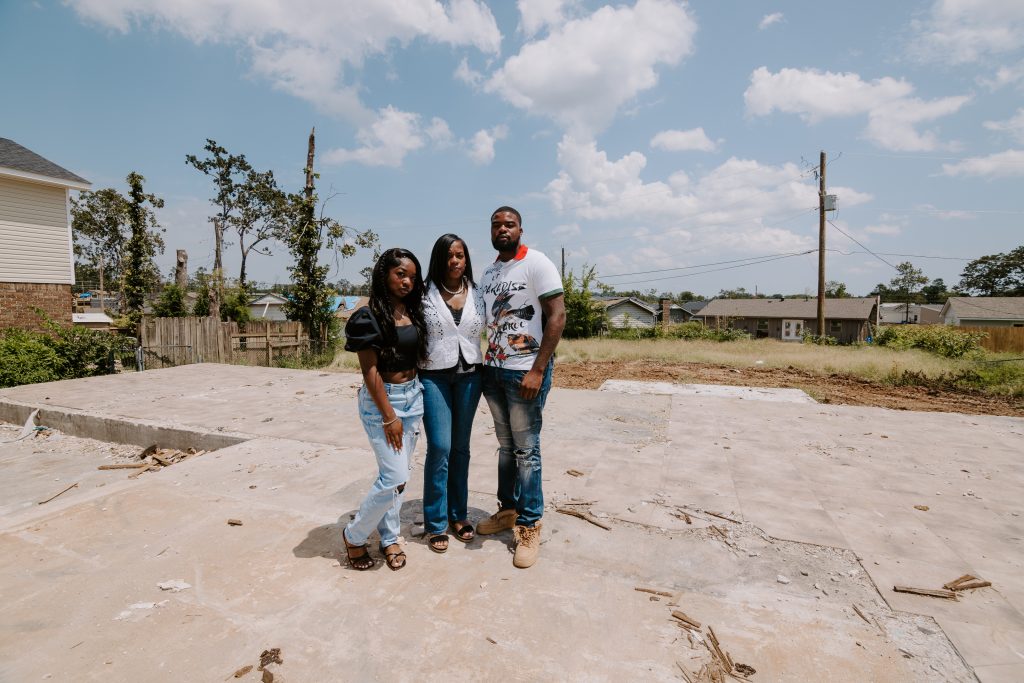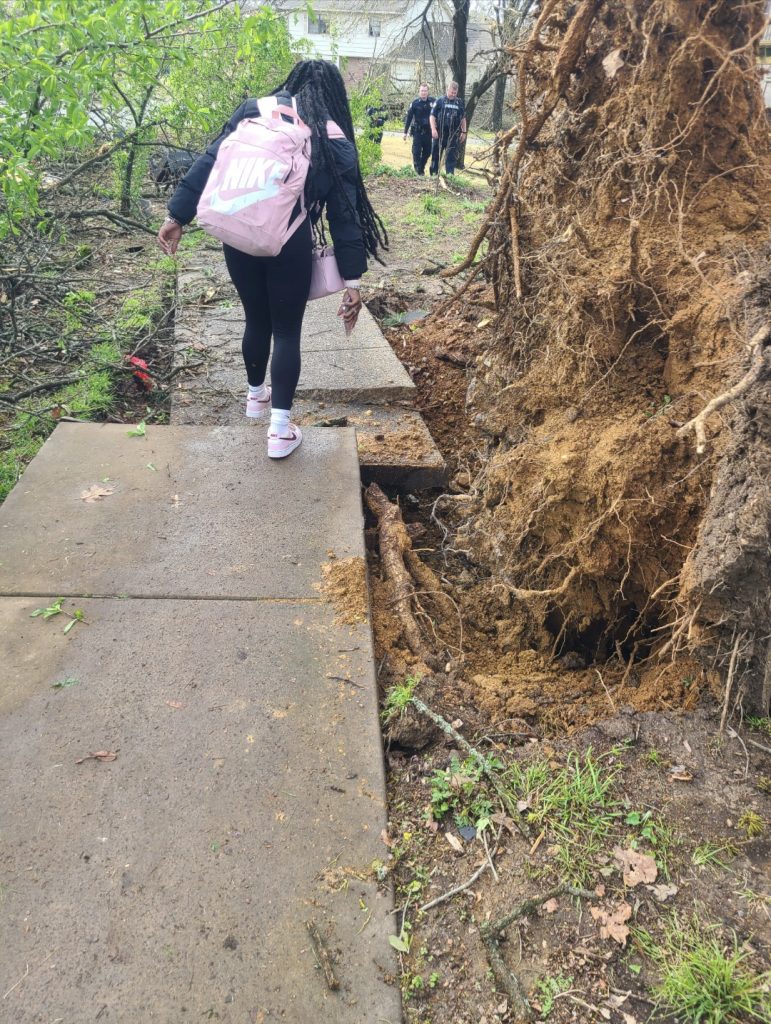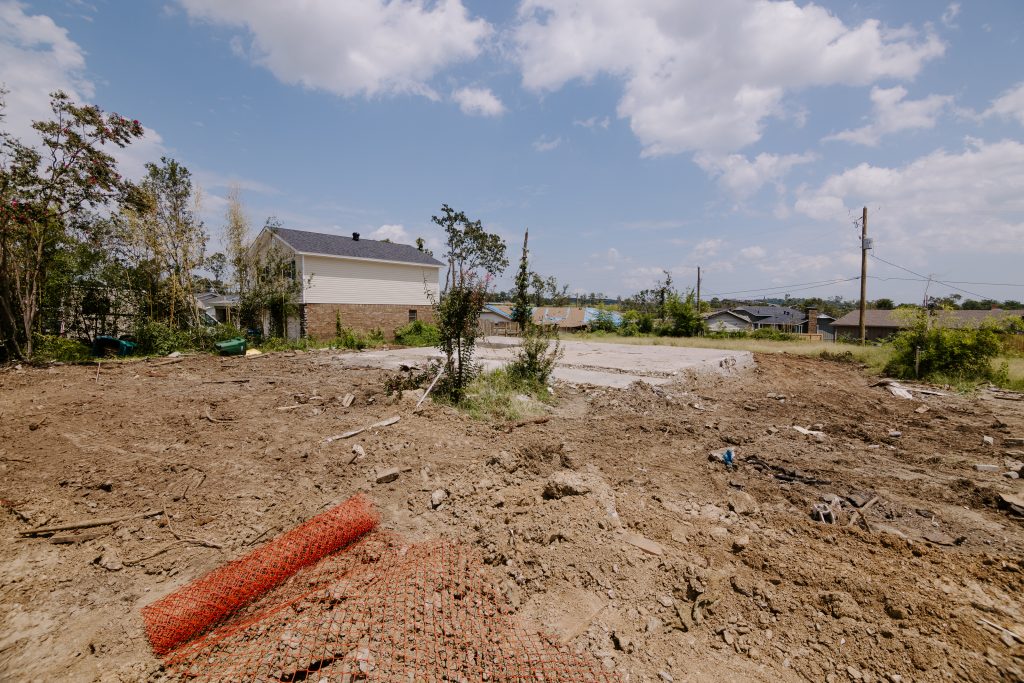By Kim Dishongh
Charlotte Jackson was at work when a tornado tore through her neighborhood on March 31, 2023.
Her focus during the storm had been on the children in her care at a kindergarten through 8th grade school and on calming her daughter, across town at the high school she attends.
In the aftermath, she faced shock and confusion at seeing what little was left of her home.
“I couldn’t tell which house was mine at first,” she said. “There was no roof and a portion of the back side of it was wiped off by the biggest tree in my yard.”

Jackson’s disabled sister lived with her, but fortunately she had gone on a rare outing with a friend that day. Jackson’s 20-year-old son was also out and the 6-year-old grandson who often stays with her was in school.
It took her two days to free the family’s dog, a 100-pound cane corso, trapped between a huge fallen tree and the back of her house, and send him to stay with a friend while she figured out what to do next.
“I couldn’t open the back door to get to him, and I know why now,” she said. “It was because of the structural damage to the house. Anything could have caused that wall to tumble over. They literally put together ropes and boards to keep it from falling over. It could have crushed me.”
Jackson had a small bag of clothes in her backseat because she was prepared to leave right after work for a weekend of travel volleyball with her daughter. She couldn’t go, of course.
“I had never missed a game,” said Jackson. “There were so many decisions to be made in that moment. I think decision-making almost happened without you, you know? Like you’re just instantly planning your next step. That’s constant. I mean, even today.”
Jackson and her sister slept in her truck in a hotel parking lot the first night, unable to find a vacancy or a voucher.
The next day, a church donated tarps and sent out people with chainsaws to help with cleanup.
In the days that followed, there was more help offered, in various ways and from multiple sources.
“I had never been through anything like that before,” she said.

Volunteers from all over the state — and beyond — had converged upon storm victims, offering to help them box up belongings, she said.
“Most people think the volunteers from everywhere that come initially is helpful — and it is,” she said. “But it’s not the right protocol.”
The insurance adjuster wanted to see things just as they were immediately following the disaster, and moving – or removing — things can affect claims and compensation, Jackson explained.
She might have gathered things on her own, anyway, to protect them from further damage from the elements. “You want to gather your things, find things that are sentimental to you,” said Jackson. “But once you file your claim with your insurance, that’s when you know that no one should have touched these things. There’s a slap on the hand for that, and you don’t know any better.”
Jackson thinks some of her belongings might have been stolen before that, by predators who snuck into the neighborhood, removing boards and slicing through tarps that covered holes ripped open by the tornado. She can’t be sure, though, the things that are missing weren’t blown away by the storm.
Many of the clothes that were boxed up by the insurance restoration service were damp when stored and are now moldy and unusable. She does not have the budget to go out and replace everything that was in her closet, what with everything else she lost, so she got a few outfits for work and wore them on repeat until school ended for the summer.
Kenya Brooks can relate. Brooks didn’t have so much as a pair of shoes after the tornado struck her apartment building. She and her teenaged son, Karson, and a little girl Brooks was tutoring had huddled in the bathtub of Brooks’s Little Rock apartment as the tornado roared through.
“I had my arms around them, and you could hear the bricks being pulled off the side and the roof being torn off,” Brooks said. “I go out, and there’s a busted gas line, so now there’s a gas leak. I was like, ‘OK, now we have to figure this out. We survived a tornado, we’ve gotta go.’”
She had taken off her shoes when she got home that afternoon, expecting this storm to pass like so many others had in the past. She doesn’t even remember her feet being sliced after the storm, as she picked her way across the floor, where glass and debris mingled with Karson’s video game system and broken furniture and other now-destroyed personal belongings.
She and the kids huddled in the entryway to another building for a while, directed away from the gas leak. Someone she did not know brought out alcohol to clean her wounds before they had to move further away for safety. Brooks stayed with a friend that night, and Karson’s track coach and someone he knew pooled money to cover a week’s stay in a hotel for them after that.
The community really pulled together,” she said. A high school in the area opened its doors as a shelter and a place to dole out food, clothing and hygiene items. The PTSA at the school where she worked collected hygiene items, batteries and gift cards, and churches in the area opened food and clothing pantries as well.
“The Tide people let us wash two loads of clothes free, and there were food trucks that had food, and that was great,” said Brooks. “I will say that there was difficulty in getting the information.”
Brooks often did not see social media posts about resources in time to get the help she needed, and websites that might have been useful were not updated quickly enough for her to find out where to go.
“Somebody that worked for the city was handling hotel vouchers, and I emailed, but I never got a response,” she said. “I think the resources and things that were available were great, but I think getting the information out to the people so they could take advantage of those resources was not that great.”
She hesitates, worried about sounding ungrateful, but if she’s honest, Brooks has to admit that not all of the donations were good matches, either. She was grateful for the support, though much of the clothing items didn’t fit her or her son properly or fit the requirements of their job or school. It might have felt trivial, but she had been through trauma and desperately needed to feel the familiarity of clothes she might have chosen for herself.
A few days after the storm, Brooks got a text message from her apartment management letting her know she could schedule a time to get things from her apartment. “They were really worried about the integrity of our buildings,” Brooks said.

In the short time she was allowed in, she grabbed clothing and some of Karson’s things. She didn’t come away with much, but she chose items that were most meaningful. Finding a new place to live was a challenge. Apartments in her price range were scarce, and there were several people trying to get in. And it was expensive.
“That was frustrating,” she said. “A lot of people were running these move-in schedules where there were specials to get in, but then rent was outrageous. I just lost everything — I can’t afford to give you $2,500 a month. The application fee, the admin fee… if you’re thinking about people who have lost everything, these fees are nonsensical.”
In all this, there have been lessons learned. “I would say that people need to be prepared, and at least have important documents in one special spot,” said Brooks, who wishes she could have done that rather than having to pay to replace social security cards and birth certificates after the fact.
She knows people wanted to help, and that many weren’t sure how. “I think the best donations were either gift cards or money for toiletries or other things you need,” she said. For both Brooks and Jackson, the recovery process is ongoing.
Jackson’s insurance adjuster was initially not allowed to enter the neighborhood. She understood that there were safety issues, and later that there was a need to keep out looters who showed up to prey on victims with unoccupied, impossible-to-secure homes. But the restricted access delayed her claim, and with extra delays due to labor and supply shortages, demolition of the old house took longer than expected, and construction of a new one has yet to begin.
She has lived in five temporary locations since April, often having to leave work at a moment’s notice to remove her family’s belongings from one and find another when an insurance matter cropped up.
The insurance allowance she gets to cover temporary housing, however, is about to run out.
“And I can’t afford it,” says Jackson. “I’m not sure what we’ll do.”
